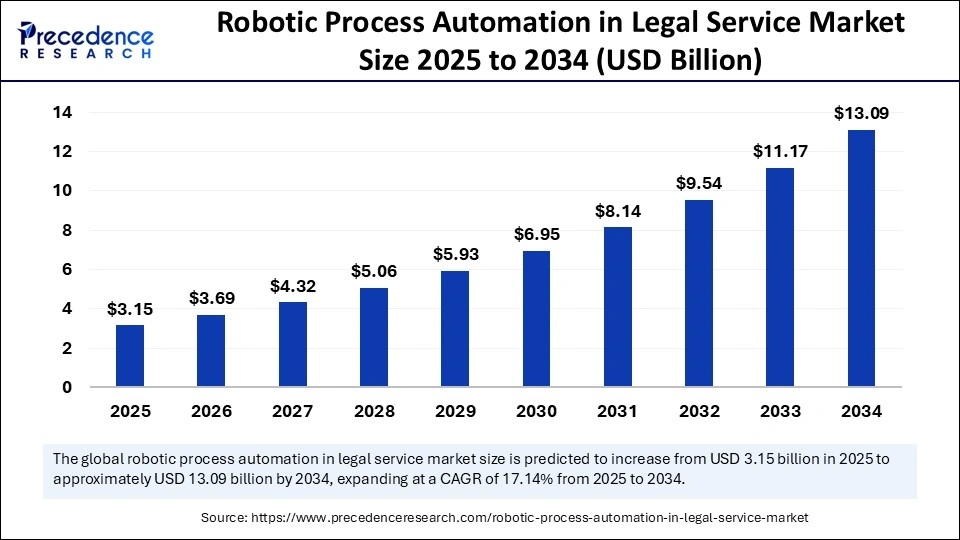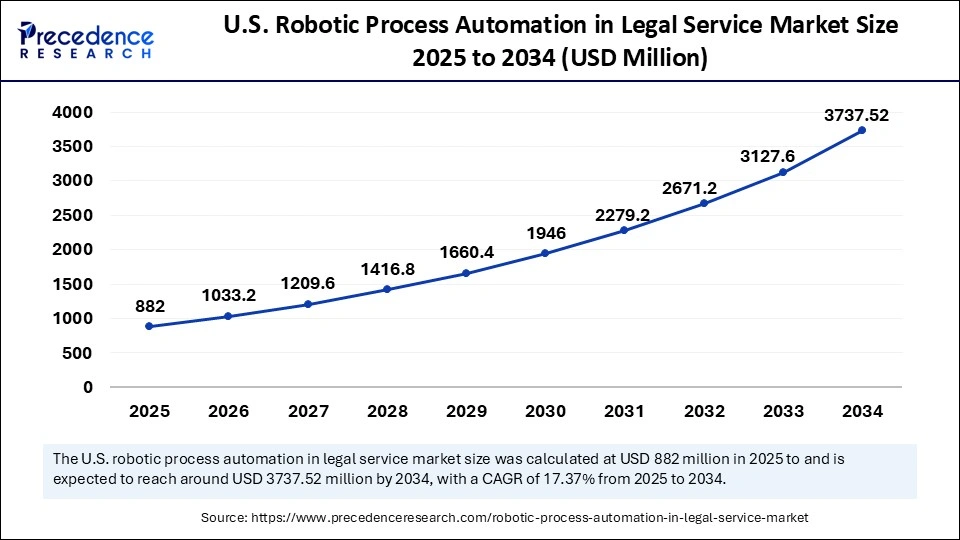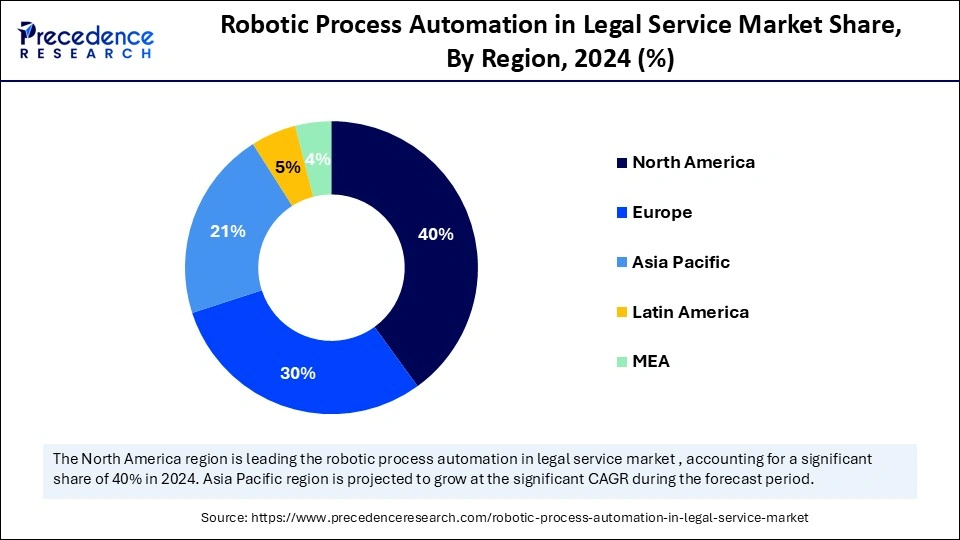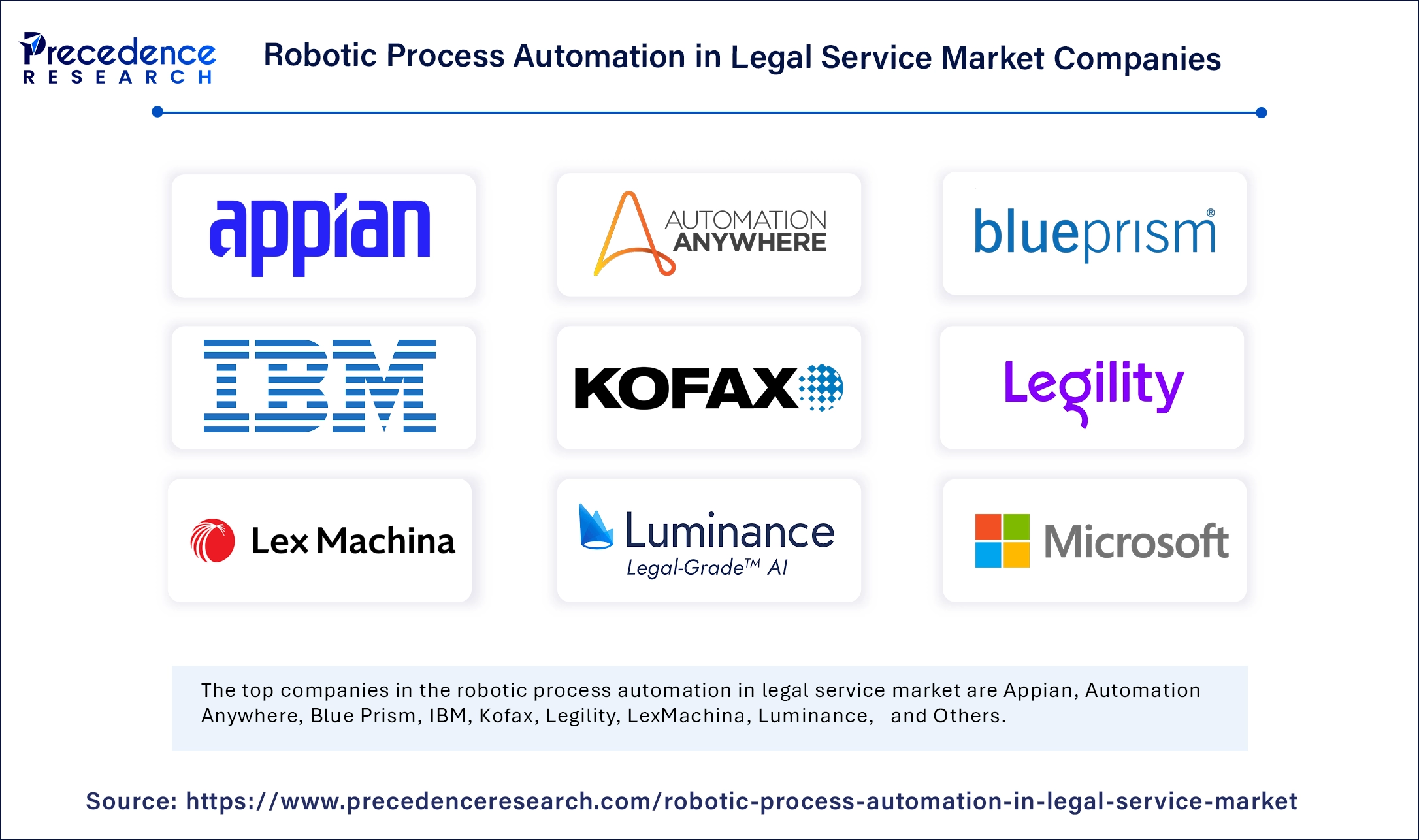March 2025
The global robotic process automation in legal services market size is calculated at USD 3.15 billion in 2025 and is forecasted to reach around USD 13.09 billion by 2034, accelerating at a CAGR of 17.14% from 2025 to 2034. The North America market size surpassed USD 1.08 billion in 2024 and is expanding at a CAGR of 17.24% during the forecast period. The market sizing and forecasts are revenue-based (USD Million/Billion), with 2024 as the base year.
The global robotic process automation in legal services market size accounted for USD 2.69 billion in 2024 and is predicted to increase from USD 3.15 billion in 2025 to approximately USD 13.09 billion by 2034, expanding at a CAGR of 17.14% from 2025 to 2034. The market growth is attributed to the increasing adoption of automation for streamlining legal processes and ensuring compliance with evolving regulatory requirements.

Artificial intelligence technology is currently revolutionizing robotic process automation adoption for legal work through its ability to boost productivity alongside precision and manage large-scale operations. Law firms, alongside corporate legal departments, use AI automation to enhance document review while analyzing contracts and monitoring compliance processes. The combination of cost-cutting requirements together with quicker case processing times drives organizations toward implementing AI-based solutions. Professional legal workloads decrease through automated legal research performed by sophisticated algorithms that utilize advanced natural language processing.
The U.S. robotic process automation in legal services market size was exhibited at USD 753.20 million in 2024 and is projected to be worth around USD 3737.52 million by 2034, growing at a CAGR of 17.37% from 2025 to 2034.

North America dominated the robotic process automation in legal services market with the largest share in 2024, due to the advanced technology foundation, along with a commitment to efficiency in North America, which drives law firms and corporate legal departments to adopt RPA solutions. A 2025 CLOC report indicated that 83% of legal departments faced increasing demand, thus triggering AI adoption, which has reached a double rate since then, including RPA technologies. The legal industry is embracing automation with great enthusiasm, as it has the ability to increase productivity while handling escalating workloads better.
The United States stands as the biggest adopter of RPA technology in legal services, as it hosts major legal tech companies and advanced AI-based regulatory compliance mechanisms. The American Bar Association (ABA) acknowledges through formal recognition that automation technologies help law practitioners decrease expenses and enhance case outcomes.
Canadian provinces Ontario and British Columbia are advancing RPA adoption through their law firms to better manage case filing and e-discovery operations. Furthermore, the regional leadership in legal automation technology stands out in North America with recent developments that demonstrate a commitment to modern legal service delivery systems, thus fuelling the market.
Asia Pacific is projected to host the fastest-growing robotic process automation in legal services market in the coming years, owing to the increasing legal demand at a rapid pace throughout the Chinese and Indian economies, which operate among the fastest expanding economies in the world. Legal service providers across Asia Pacific invest in RPA technologies to handle efficiently the rising amount of legal work. Digital transformation momentum, along with government backing, propels this growth pattern further. Countries such as China, India, Japan, and Australia demonstrate rapid economic expansion through which their legal service requirements continue to increase.

The Russian government actively supports digital legal transformation through the 14th Five-Year Plan (2021-2025), which motivates law firms to deploy AI automation systems. The Indian legal sector has experienced a dramatic increase in technology startup activity as firms implement RPA to automate their contractual obligations tracking and regulatory compliance management. The Japanese legal system, which operates through strict frameworks, has initiated automation efforts to enhance documentation management as it deals with workforce demographics issues associated with aging professionals. Furthermore, the current digital transformation push, which governments actively support further boost the market in the coming years.
The need for both efficiency enhancements and cost reduction strategies in legal services created the demand for the integration of robotic process automation (RPA) into the industry. Through RPA technology, automated software robots handle repetitive tasks, which include document management and data entry processes, to achieve better operational results and precision. Law firms, together with corporate legal departments, use RPA technology for process streamlining and human error reduction in order to redirect resources to more important strategic work. The robotic process automation in legal services is experiencing substantial growth, as legal entities strongly pursue automation technology implementation.
| Report Coverage | Details |
| Market Size by 2034 | USD 13.09 Billion |
| Market Size in 2025 | USD 3.15 Billion |
| Market Size in 2024 | USD 2.69 Billion |
| Market Growth Rate from 2025 to 2034 | CAGR of 17.14% |
| Dominated Region | North America |
| Fastest Growing Market | Asia Pacific |
| Base Year | 2024 |
| Forecast Period | 2025 to 2034 |
| Segments Covered | Process Type, Application, End User, Deployment Type, and Regions |
| Regions Covered | North America, Europe, Asia-Pacific, Latin America and Middle East & Africa |
High volume of legal documentation and case management
High volume of legal documentation and case management requirements is likely to boost the robotic process automation in legal services market. The automation of document-related processes has gained prominence as organizations seek to improve the accuracy and consistency in their work. The implementation of AI technology for document organization has optimized search capabilities, so attorneys need less time to find research materials. Furthermore, the technology adoption demonstrates the legal industry's dedication to enhancing operations for better efficiency and service delivery to clients, which further fuels the market in the coming years.
Data privacy and security concerns
Data privacy and security concerns are projected to limit the adoption of robotic process automation in legal services, thus hindering the market. The handling of confidential client information, consisting of contracts and intellectual properties, and litigation documents, necessitates that law firms follow strict data protection requirements. Encryption platforms that use artificial intelligence automation need to follow both GDPR and CCPA legal standards. The risks to confidential legal documents increase as cybersecurity threats involve unauthorized data access and system vulnerabilities, together with data breaches.
Growing adoption of cloud-based legal automation platforms
Growing adoption of cloud-based legal automation platforms is anticipated to create immense opportunities for the players competing in the robotic process automation in legal services market. Cloud-based legal automation platforms continue to increase in popularity as they are transforming the way law firms deliver their services. More law firms choose cloud-based solutions as these systems provide enhanced data protection and easier accessibility, and better collaboration benefits across various locations. Cloud-driven automation technology adoption remains accelerated by growing remote legal service demands, which allows legal professionals to securely retrieve critical information no matter where they work.
In 2024, the rule-based processing segment led the global robotic process automation in legal services market. The legal profession uses RPA systematically for regularly occurring basis rules to achieve higher efficiency through automated processes while minimizing human mistakes. Operations run more smoothly, as automated data entry, together with document management tasks, enables legal professionals to perform strategic work. As of 2024, there are 356 LawTech companies operating in the UK, reflecting a significant investment in legal technology solutions, including RPA. The need to administer large volumes of documents within litigation and compliance operations and client communication practices determined this development, thus further fuelling the market.
The knowledge-based processing segment is projected to expand rapidly in the market in the coming years. Modern legal organizations require sophisticated data management systems as the amount of legal information increases steadily in size and complexity. Knowledge-based processing enables users to automate tasks involving legal research and contract analysis, therefore minimizing human errors while maintaining legal standards compliance. The upcoming technological advancement drives organizations to implement RPA in knowledge-based processing, as they need optimized legal operations and better risk management of legal analysis.
The document management segment held a dominant presence in the robotic process automation in legal services market in 2024. Law firms implement RPA technology to manage their large number of legal documents, as they reach higher efficiency and lower manual error rates. RPA automation within document management operations makes professionals focus on business-critical tasks while streamlining operational procedures. The need to handle extensive legal paperwork in litigation cases and compliance, and client communication work drives the adoption of this trend of robotic process automation in the legal sector.
The contract management segment is expected to grow at the fastest rate during the forecast period of 2025 to 2034, owing to the rising contracts of increased complexity and volume. RPA enables organizations to automate contract procedures starting from creation through review and monitoring, which prevents mistakes while keeping contracts compliant. RPA follows contract lifecycles by delivering real-time alerts to essential parties about significant deadlines and duties, which improves organizational performance. RPA's technological advancement enters contract management to enhance business adoption, mainly through legal operations optimization and risk mitigation within contract administration processes.
The law firms segment dominated the global robotic process automation in legal services market in 2024. This demand for simplifying repetitive work while boosting operational effectiveness and decreasing expenses has been the underlying reason behind this development. Suitable task automation by law firms lets them move resources from basic operations to high-priority business functions, which creates competitive advantages and delivers better service to clients. RPA implementation helps organizations achieve better compliance management simultaneously with reducing the probability of human errors in routine workflows.
The corporate legal departments segment is projected to grow at the fastest rate in the future years. Corporations must automate their contract management, as regulatory complexities and efficient operations necessitate proper automation. RPA enables corporate legal departments to process extensive numbers of contracts alongside compliance documents better and deliver precise and prompt results. The organizational change enables corporate lawyers to concentrate on critical decisions and risk assessment, thus ensuring better alignment between legal work and business targets. RPA achieves its best results by integrating with artificial intelligence, which delivers superior data analytics capabilities that generate proactive legal insights.
The on-premises segment accounted for a considerable share of the robotic process automation in legal services market in 2024. The need to protect sensitive client data, combined with data privacy requirements, led law firms to select on-site systems for their RPA solutions. Safety regulations were maintained through this preference, which also reduced the likelihood of unauthorized data breaches. Firms built durable IT infrastructure inside their facilities to support their RPA systems while enabling unique implementation of their operational workflows. Law firms established on-premise deployments, as they needed immediate critical legal data access without requiring network dependence. The method gave organizations full control to manage their automation while providing them with independent oversight of their operations.
The cloud-based segment is anticipated to grow with the highest CAGR during the studied years, owing to the growing trend of organizations requiring scalable and affordable solutions. Cloud-based RPA solutions enable law firms to manage their resource needs according to client demand, as no big capital outlays for hardware equipment are required. Remote work patterns show that accessibility plays a critical role, and cloud platforms provide secure access for legal professionals to work from various locations. Cloud security advancements now guarantee the safe handling of confidential legal data, so cloud computing can be used as a practical solution, thus further fuelling the segment in the coming years.

By Process Type
By Application
By End User
By Deployment Type
By Region
For inquiries regarding discounts, bulk purchases, or customization requests, please contact us at sales@precedenceresearch.com
No cookie-cutter, only authentic analysis – take the 1st step to become a Precedence Research client
March 2025
February 2025
October 2024
September 2024